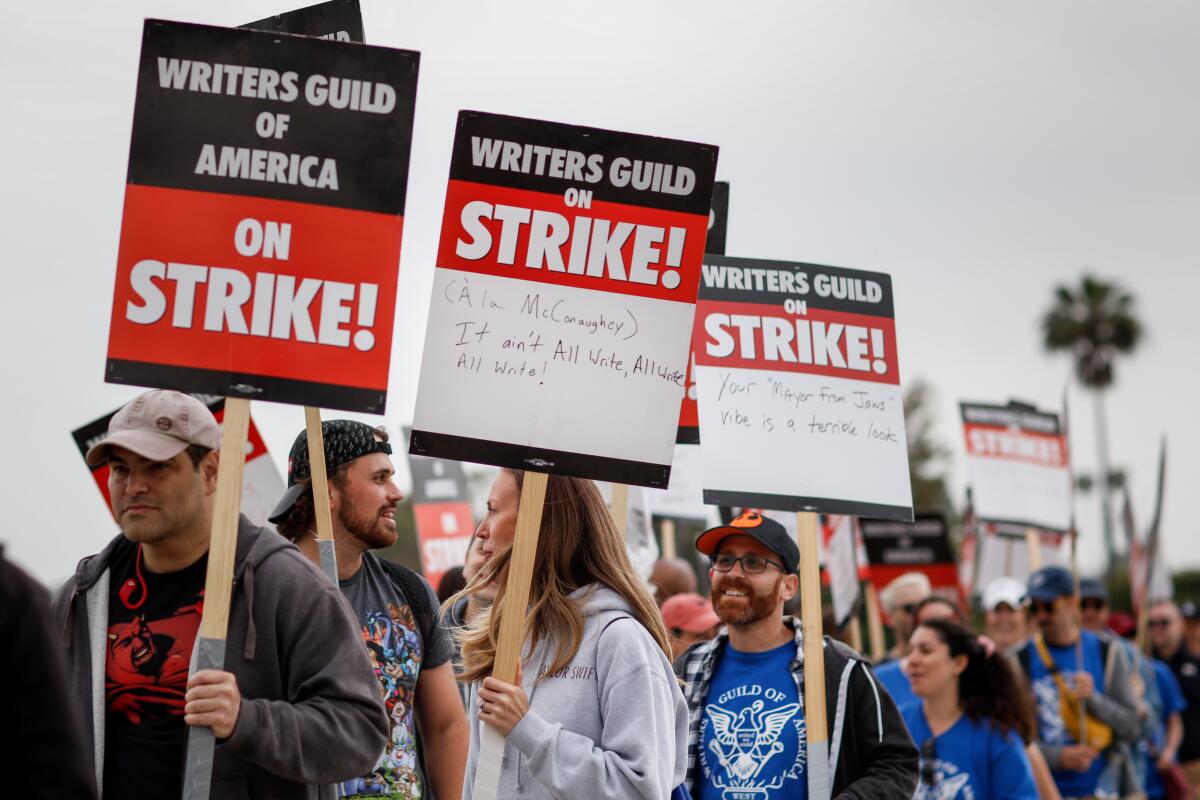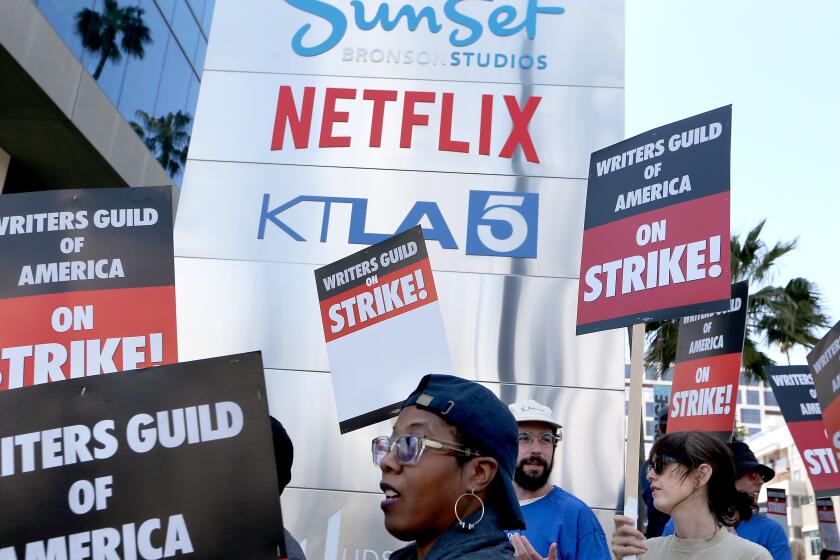In the shadow of the writers’ strike, Hollywood studios turn to directors for deal on pay

- Share via
Hollywood’s fraught labor negotiations will enter a new and uncertain phase on Wednesday as the major studios begin negotiations with the Directors Guild of America while striking writers continue to stage protests nationwide.
In years past, the studios have turned to the DGA — which has gone on strike just once (for a few minutes) and has a history of settling contracts quickly and peacefully — to craft an agreement that could serve as a framework for other unions, including the Writers Guild of America, whose members are now in their second week of a walkout.
Such a scenario played out in January of 2008, when the DGA reached a deal with the studios over internet compensation that laid the groundwork for a rapprochement with writers that ended their 100-day strike.
But circumstances are far different today than 15 years ago, suggesting that the Alliance of Motion Picture and Television Producers could be facing another tough round of negotiations.
In the past, there were real tensions and disagreements between the unions over bargaining strategy and goals.
Today, the two unions seem more in sync and share many of the same concerns about their members being left behind by the streaming revolution and the shift to what some have described as a gig economy.
The higher degree of union solidarity was in evidence last week when leaders from the DGA, Teamsters and other Hollywood unions gathered at the Shrine Auditorium with 1,800 writers in a show of support.
Writers Guild of America negotiating committee co-chair Chris Keyser described the collaboration as unprecedented.
“If the studios think they are going to undermine our solidarity by making a deal with directors, they have mis-analyzed the situation,” Keyser said in an interview.
Like the writers, Hollywood’s directors have significant differences with the studios on a number of issues related to the way streaming has eroded their compensation.
“We know there will be conflict,” DGA negotiating committee co-chair Todd Holland said in a video to DGA members posted Tuesday. “The battle will test us. But we won’t rest until we win a strong contract today that builds a bridge to continued DGA prosperity into the future.”
Directors are warning this will be a tough year for labor talks as studios cut staff and productions.
The studios have been preparing for months for a writers’ strike by stockpiling scripts and moving up production to get around the need for writers on set.
So far, the strike has halted or disrupted a number of TV productions including Netflix’s “Stranger Things,” Apple’s “Severance” and Walt Disney’s “Daredevil: Born Again,” as Teamsters and other union members refused to cross the WGA’s picket lines.
The fallout will be even more severe if directors and actors also stage strikes.
The DGA — whose 19,000 members include directors, unit production managers and assistant directors — has been uncharacteristically vocal ahead of the talks.
“This will not be an ordinary negotiation,” negotiations committee chair Jon Avnet and National Executive Director Russell Hollander said in a statement last November.
Why many members of the Writers Guild of America have targeted streaming giant Netflix in their fight for higher streaming residuals.
In February, the DGA said it would only negotiate with studios early, months before its contract expires, if the studios “are prepared to satisfactorily address our concerns.”
When that didn’t happen, the DGA put off its negotiations until May, which is unusually late for a union with a tradition of early bargaining.
And now the DGA and the studios have only a small window of time in which to negotiate a new three-year deal. The current contracts for the DGA and SAG-AFTRA expire on June 30.
The AMPTP will need to turn its attention to SAG-AFTRA and its contract from June 7.
The AMPTP declined to comment.
Like writers, directors complain of not knowing when the next gig will be and that residuals — the royalties creators get from re-airing of films and TV shows — that sustained them in the past no longer do so.
With studios now owning distribution and production, directors are concerned about the lack of an open market for their films and TV shows, which has eroded their residual income, DGA President Lesli Linka Glatter said in an op-ed published in Variety on Tuesday.
“Make no mistake: The current position of the studios is a threat to the economic model that for decades has protected tens of thousands of good, union jobs in our industry,” Glatter wrote.
More to Read
Inside the business of entertainment
The Wide Shot brings you news, analysis and insights on everything from streaming wars to production — and what it all means for the future.
You may occasionally receive promotional content from the Los Angeles Times.













